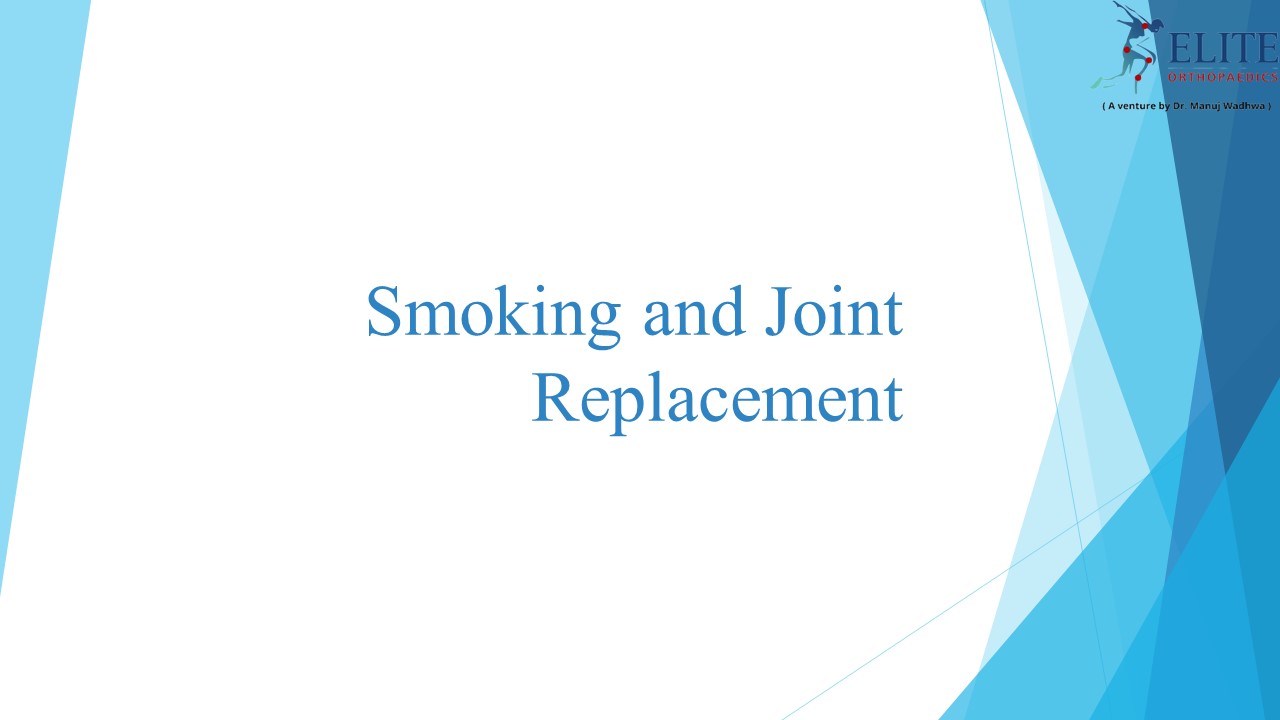Smoking and Joint Replacement - PowerPoint PPT Presentation
Title:
Smoking and Joint Replacement
Description:
Joint replacement surgeons often hear this question in their offices. Quitting smoking is one of the most critical things to do in preparation for hip or knee replacement surgery for it to be successful. It is well known that the effects of nicotine on the body directly cause chronic obstructive pulmonary disease, lung cancer, vascular disease, hypertension, coronary artery disease, and blood clots – just to name a few. It is important to know that smoking and using nicotine products can negatively impact upcoming hip or knee replacement surgery and how well you do after surgery. Visit: – PowerPoint PPT presentation
Number of Views:3
Title: Smoking and Joint Replacement
1
Smoking and Joint Replacement
2
WHY QUIT SMOKING/ TOBACCO BEFORE JOINT
REPLACEMENT
- Doctor, Im a chain smoker and I am planning for
my knee replacement surgery. Should I continue
smoking and have my surgery? - Joint replacement surgeons often hear this
question in their offices. Quitting smoking is
one of the most critical things to do in
preparation for hip or knee replacement surgery
for it to be successful. It is well known that
the effects of nicotine on the body directly
cause chronic obstructive pulmonary disease, lung
cancer, vascular disease, hypertension, coronary
artery disease, and blood clots just to name a
few. It is important to know that smoking and
using nicotine products can negatively impact
upcoming hip or knee replacement surgery and how
well you do after surgery.
3
How Nicotine Impacts Healing
- Toxins in cigarette smoke affect the bodys
inflammatory response which in turn affects the
bodys ability to heal. This can lead to weak
scar tissue and an increased risk of problems
with the wound. Studies have shown that active
cigarette smokers have up to 1.5 to 3.2 times
increased risk of wound-related complications
following joint replacement surgery. The carbon
monoxide and nicotine gas in tobacco smoke reduce
the ability of blood to carry oxygen to tissues
effectively. - The toxins in cigarette smoke also alter the
bodys immune system by slowing the white blood
cells ability to respond to infections.
Ultimately, the poor scar formation, wound
problems, poor oxygen delivery, and poor immune
response from smoking have the combined effect of
greatly increasing your risk of developing a
prosthetic joint infection by up to 1.8
times. Infection after joint replacement surgery
can be a devastating complication, and every
effort should be made to prevent these
complications.
4
Healing and Pain issues with smokers
- Many published articles have shown that active
smokers take longer to recover and stay longer in
the hospital following hip and knee replacement
surgeries. In addition, smokers have increased
rates of being readmitted to the hospital for
complications after surgery. Tobacco smokers have
been found to have poor pain control after joint
replacement surgery and compared to nonsmokers,
they require significantly greater doses of
narcotic pain medications like opioids. Smoking
distorts a patients immune system and can delay
healing, increasing the risk of infection at the
wound site. Smoking just one cigarette decreases
the bodys ability to deliver necessary nutrients
for healing after surgery.
5
Quitting is Essential
- Although smoking can have these devastating
complications, the good news is that quitting
smoking and avoiding nicotine products can
improve your chances of having a successful
surgery. If you quit smoking for four to six
weeks prior to surgery and continue for four
weeks after, studies show that you can reduce
your risk of complications by up to 50. The
longer you stay away from smoking and nicotine,
the greater the benefit. - Still, research has shown that regardless of
current smoking status, the amount that one
smoked over his or her lifetime significantly
contributed to the increased risk of
complication. This risk increased depending on
how many packs had been smoked per decade.
6
BOTTOM LINE
- Smokers Show an 80 Percent Increase in Risk of
Reoperations for Infection, so a smoking
cessation program is essential before Joint
Replacement surgery. The good news is that an
upcoming surgery can be just the motivation a
smoker needs to finally kick the habit. Quitting
tobacco is always a good idea, and your upcoming
surgery can be a game-changer. - For more details and appointments, you
may consult our expert surgeon, Dr. Manuj
Wadhwa. To schedule an online appointment, please
click here..In case of emergency, visit us.































